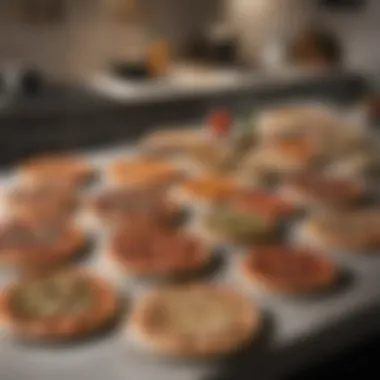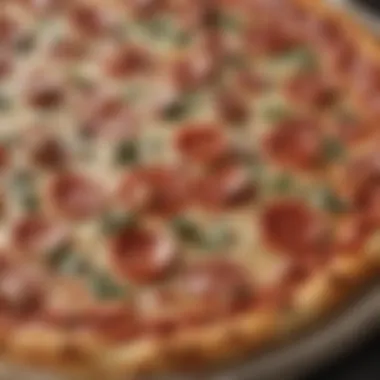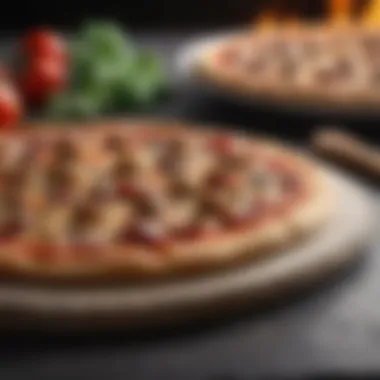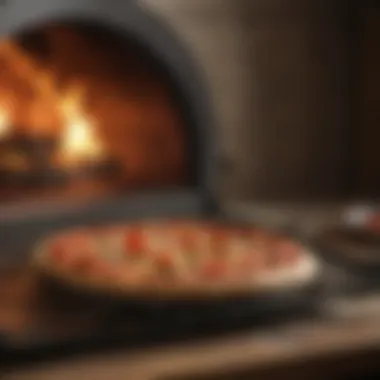Where to Buy the Best Pizza Stone for Your Oven


Intro
Purchasing a pizza stone requires some understanding of various factors that go into your decision. Pizza lovers know that the right stone can significantly affect the taste and texture of the final product. Thus, it's essential to not only know where to buy a pizza stone but also what features define a quality stone. Here, we will explore various places and types to buy pizza stones for your oven. This guide caters to both methodical cooks and those just starting to dive into the world of pizza-making.
Types of Pizza Stones
There exists a variety of pizza stones. The material, size, and shape often inspire personal preference. Here are some common types:
- Clay Pizza Stones: Known for excellent heat retention. They absorb moisture quite well, resulting in that perfect, crispy crust.
- Cordierite Stones: Highly durable and can withstand thermal shock, making them perfect for quick oven temperature changes.
- Steel Pizza Stones: A newer option that offers a different way to produce heat. Steel versions are often thinner and may retain heat better than traditional stones.
Considerations for Selection
When selecting a pizza stone, consider:
- Size: Ensure it fits in your oven. Measure the area inside, including space for airflow.
- Material: Different materials contribute differently to the cooking process. Understand the pros and cons of each type.
- Thickness: A thicker stone may provide better heat stability.
Where to Purchase a Pizza Stone
Purchasing can be done both online and offline. Here are several suggestions:
Local Kitchenware Stores
Many local kitchenware stores carry a range of pizza stones. Staff often have knowledge to help you select the best option for your cooking style. Established stores like Williams Sonoma or Sur La Table can provide firsthand guidance.
Online Retailers
If you prefer the flexibility of browsing a wider selection, e-commerce sites can be ideal:
- Amazon: Offers a huge range of choices along with customer reviews. You can find high-rated products like the Pampered Chef Baking Stone or the Pizzacraft Brioche Steel.
- Walmart: Known for keeping competitive pricing, so checking their inventory online can also yield good options.
Specialty Cooking Stores
Some specialty stores often provide unique selections. For instance, Chef’s We might focus on providing high-quality products catering to client preferences. Research these vendors in your area; they may carry exclusive brands.
Finding a suitable spot to buy a pizza stone can undoubtedly enhance your pizza-making experience, helping turn regular meals into delightful culinary creations.
Final Thoughts
Understanding Pizza Stones
Understanding pizza stones is essential for anyone serious about making quality pizza at home. A pizza stone enhances the cooking process. It absorbs and retains heat better than metal trays. This characteristic results in a crispy crust, which is a hallmark of great pizza.
Many may not realize the importance of the surface on which pizza is cooked. Without this consideration, the finished product may end up soggy or unevenly cooked. Therefore, recognizing the features of pizza stones, such as material and thickness, lays the groundwork for smarter choices when buying.
Further, the specific benefits provide insights into how a pizza stone affects oven cooking. Cooking on stone enables a more integrated cooking environment. It mimics the flooring of traditional pizza ovens. So, having that understanding adds value to the reader's overall baking experience.
Defining Pizza Stones
A pizza stone is a flat surface designed to be placed in an oven, primarily for baking pizza. Generally, they are made from various materials, including ceramic, cordierite, steel, and composite. The primary function of pizza stones is to absorb moisture from the dough, which results in a better crust finish.
These stones come in different sizes and shapes, catering to varying oven capacities and types of pizzas. Some stones are round, while others might be rectangular. Understanding these distinctions helps in selecting the correct stone for your needs.
Benefits of Using a Pizza Stone
Using a pizza stone offers several advantages that enhance your pizza-making journey:
- Better Heat Distribution: Pizza stones not only hold heat but radiate it evenly, providing consistent cooking.
- Crispier Crust: A dry, hot surface results in less moisture retention in the dough. This gives the pizza crust a more desirable texture.
- Versatility: Pizza stones can be used to bake a variety of dishes beyond pizza, like bread or pastries.
- Improved Flavor: Cooking on stone can enhance the flavors of the pizza, making it taste closer to what you would get from a professional pizzeria.
Understanding pizza stones plays a critical role in achieving desirable results. The better prepared you are, the more you will enjoy the process and final product.
Types of Pizza Stones


Understanding the different types of pizza stones remains a crucial aspect when deciding on the best one for your oven. The material composition inherently influences cooking performance. Each type boasts unique properties, resulting in varying heat retention and transfer characteristics. Hence, consider these differences closely to pick the one most suitable for your cooking style and pizza preferences.
Ceramic Pizza Stones
Ceramic pizza stones are popular due to their high temperature resistance and excellent heat retention. They create an ideal cooking surface for achieving crispy pizza crusts. During operation, ceramic unevenly distributes heat, which means they need to be preheated adequately for optimal results. However, handling can be tricky. Though durable, they can crack under sudden temperature changes, like dropping a cold pizza on a hot stone. It's best to keep ceramic segments away from extreme thermal variations.
Cordierite Pizza Stones
The cordierite stone excels in heat tolerance. Often used in industry-standard ovens, these stones can withstand high temperatures and offer quick absorption of moisture from dough. This aids in crafting that crunchy crust adored by many. What distinguishes cordierite is its resilience; it is incredibly less likely to crack compared to its ceramic counterpart. Therefore, for those seeking sturdiness and versatility, choosing a cordierite pizza stone tends to be rewarding.
Steel Pizza Stones
While not as commonly discussed, steel pizza stones are gaining traction amongst baking aficionados. They possess remarkable heat conduction properties. As a result, cooking time can decrease significantly—all while delivering exceptional results. Using steel offers a different experience: being robust, it also tends to work best in edge ovens that reach high temperatures quickly. Users will find that the cooking surface can deeply affect the overall texture of the pizza, making this option quite intriguing for some.
Composite Pizza Stones
Composite stones aim to combine the strengths of different materials, presenting a robust yet economical option. Just as their name suggests, they feature a mixture often comprising ceramic fibers and cordierite elements. The structure aims for superior heat retention while mitigating issues like cracking. Typically, composite stones also allow for quicker heating than singular counterpart stones, making these suitable for busy kitchens. However, be wary of overly refined products, as certain brands may compromise on quality.
Where to Buy Pizza Stones
Buying a pizza stone is pivotal for achieving optimal results in your home cooking. It forms an important part in elevating the quality of your homemade pizzas. Different locations offer varying selections, prices, and advice. Knowing where to purchase can save time and ensure you obtain a high-quality product tailored to your cooking style and preferences.
Local Kitchen Supply Stores
Local kitchen supply stores tend to provide a personal touch. Knowledgeable staff are able to share their expertise and help you find the right stone. You can see, feel, and even inspect the stones in person. This might offer advantages such as perhaps avoiding shipping fees. Moreover, speaking to the staff can provide insights into specific brands and materials that work best for your oven.
Major Retail Chains
Popular retail chains often carry a selection of pizza stones suitable for many budgets. You can typically find the most common types, such as ceramic or cordierite stones. Stores like Target and Walmart may have seasonal sales or discounts, making them attractive options for those wanting to save a little on their purchase. Keep in mind that availability might vary by location, so checking online beforehand could save disappointment.
Online Retailers
Online shopping provides convenience, especially when searching for specialized or high-quality stones. You can compare prices and models efficiently across a wide platform. Plus, many retailers offer customer reviews, helping you assess the stone's performance.
Amazon
Amazon is well known for its extensive range of products. It has a wide variety of pizza stones that cater to different needs, from budget-friendly options to premium choices. A main benefit of Amazon includes user-generated reviews, providing insights that assist buyers in making educated decisions. However, be aware of potential delivery charges and varied seller reliability.
eBay
eBay presents unique used and new items from multiple sellers. This can be a great way to find unique or retro models that may not be found elsewhere. Additionally, you may stumble upon second-hand stones at a more affordable price. eBay's bidding process can work in your favor actively, but there's risk involved in purchasing from a less reputable seller, so manage discretion.
Specialized Cooking Websites
Sites focused specifically on cooking equipment provide an array of pizza stones along with well-researched articles and expert advice. Such platforms excel in product description and can provide detailed technical specifications. Shopping here often means better customer service dedicated to cooking enthusiasts. However, check for return policies as they can differ from more mainstream sites, and shipping times might be more variable.
Handcrafted and Artisan Stones
Purchasing handcrafted and artisan stones is like investing in a piece of art for your kitchen. These products prioritize meticulous craftsmanship and specially selected materials that can enhance your cooking. Local artisans can provide unique shapes and sizes unattainable through mass production. Keep a lookout for local craft fairs, or search online for artisans showcasing specialty items. The down side can be the pricing, as handmade items often come at a premium.
Factors to Consider When Buying a Pizza Stone
When investing in a pizza stone, particular factors significantly influence its performance and longevity. Understanding these elements can improve your cooking experience and enhance the quality of homemade pizza.
Size and Thickness
The size and thickness of a pizza stone impact not only its cooking efficiency but also its compatibility with your oven. A larger stone cannot fit into smaller ovens. Most home ovens can accommodate stones ranging from 12 to 16 inches in diameter. Thickness is also crucial; thicker stones provide better heat retention but can take longer to preheat.
- Thickness guide:
- 1/2 inch: Fast heating but can lead to uneven cooking.
- 3/4 inch: Good balance of heat retention and conduction.
- 1 inch or more: Ideal for professional results but less convenient to handle.
Material Quality


Material quality influences the stone's ability to absorb and retain heat. Common materials include ceramic, cordierite, and steel. Each type has its own advantages:
- Ceramic: Generally offers decent heat retention but can crack under extreme temperature changes.
- Cordierite: Strong and resistant to thermal shock, making it suitable for high-heat cooking.
- Steel: Excellent heat conduction and very durable, often preferred by professional chefs.
Heat Retention Properties
The stone's ability to retain heat plays a pivotal role in baking a perfect pizza. High-quality stones maintain temperature longer, ensuring a uniformly cooked crust. Look for recommendations regarding each product's heat retention capabilities. Pay attention to user review as they often reflect real-world applications of heat retention.
It’s important to preheat the stone before use, usually for at least 30 minutes at a high temp, to achieve the recommended cooking results.
Ease of Cleaning
Cleaning a pizza stone is a necessary part of maintaining its condition. Some materials can be easier to clean than others. For example, steel stones typically wipe off more easily compared to ceramic.
- Things to consider for cleaning:
- Non-stick surfaces: Often easier to maintain.
- Surface texture: Smoother surfaces may resist food debris.
- Cleaning tools: Specific brushes and scrapers can be helpful.
Price Range
Considering external factors can also aid in determining your budget while buying a pizza stone. Prices can range from low to high, influenced by size, material, and additional features. Understand the typical price ranges relevant to your intended use:
- Entry-level options: Typically priced between $20-$50, generally made of ceramic.
- Mid-range choices: Range from $50-$100, often cordierite with fair quality.
- High-end varieties: Can cost upwards of $100, often steel stones favored by experts.
Knowledge about these factors can significantly enhance your decision-making process when buying a pizza stone, leading to notable improvements in homemade pizza preparation.
Comparing Popular Brands
When selecting a pizza stone, the variety of brands available can make the decision daunting. By comparing popular brands, consumers can identify which options align best with their cooking style and preferences. Each brand operates on unique principles, be it construction, material, or heat retention. Understanding these differences is crucial for making an informed investment in a pizza stone that meets one's culinary demands.
Helpful considerations when comparing
- Material quality: Each brand focuses on different materials, affecting durability and performance.
- Heat retention: Not all stones distribute heat uniformly. Brands may utilize various techniques or materials to improve heat transfer.
- Customer observations: Examining reviews across several platforms aids in gauging the overall consumer experience for specific brands.
Ultimately, understanding the strengths and weaknesses of popular brands can enhance one's pizza-making capabilities.
Brand A Overview
Brand A is well-known within the culinary market for its durable and versatile ceramic pizza stones. This brand emphasizes heat retention, allowing for a crispy crust, imitating traditional wood-fired oven results. The stones come in various sizes, making them suitable for different oven types. The even heat distribution combats hot spots, ensuring well-cooked pizzas consistently.
One common theme in reviews points to the practicality of care provided by Brand A. Users often mention how easy it is to clean after use, enhancing the overall cooking experience. Yet, some customers express concerns about breakage, especially if not handled with care.
Brand B Overview
Brand B specializes in cordierite pizza stones. The main benefit of using presses from this brand is their high thermal shock resistance, which adds durability. They are designed to withstand rapid temperature changes, ensuring performance even under extreme conditions. Users highlight these stones’ strengths on social platforms, pointing out great results in different environments—from home ovens to charcoal grills.
While generally praised for their performance, some reviewers have noted that the stones can be heavier than anticipated. However, this weight contributes to stability, which is preferred by many.
Brand Overview
Brand C focuses on steel pizza stones, known for their quick heat absorption and retention properties. Users recognize that steel stones heat up faster than their other counterparts, producing high-quality pizzas in shorter times. Reviewers commonly appreciate the metallic flavor infusion that some claim contributes effectively to a more authentic pizza experience.
Despite the advantages, the thickness is a point of contention. Some consumers feel that the thicker options can be less versatile, not fitting well in some cramped home ovens. Yet, those who invest in Brand C often express satisfaction regarding the final pizza quality.
In summary, focusing on brands, their unique attributes, and user experiences helps identify the right pizza stone for personal preferences. This further enhances one’s pizza-making journey.
User Reviews and Recommendations
Understanding user reviews and recommendations is crucial in making informed choices about purchasing a pizza stone. These perspectives often add depth and realism to the benefits and drawbacks of specific products. When potential buyers read summaries or listed specifications, they may miss subtler insights only a user can provide. Feedback from actual users often details the long-term performance, durability and even the ease of use that product pipelines might overlook.
Utilizing reviews allows buyers to gauge product efficacy in true cooking environments rather than in ideal conditions presented by marketing strategies. Each oven is different, as is the skill level of the cook. Therefore, user experiences shed light on how various pizza stones operate across diverse scenarios. Through user feedback, one may also discern what stone models might consistently fall flat, saving potential buyers from costly missteps.


“A pizza stone that might work well in one kitchen's conditions could lead to disappointing results in another,” highlights varied user experiences.
There are countless platforms online where such reviews are available. Popular sites like Amazon and eBay frequently host comprehensive ratings that reflect customers’ genuine sentiments, highlighting their pros and cons in everyday contexts. Additionally, specialized cooking websites and forums may showcase discussions that reveal surprising issues or triumphs not commonly found in product descriptions.
Customer Feedback
When evaluating which pizza stone works best for your needs, seeking out customer feedback is vital. User experiences can provide valuable insights that statistics and product claims can't. Several factors generally emerge in customer reviews:
- Durability: Many users comment on how well their stones hold up over time. Signs of wear can be consistent indicators of quality.
- Baking Results: Reviews typically include numerous comments regarding crust texture, how evenly the stone distributes heat, and timing before pizza is ready.
- Ease of Use: Easy heating, cooling times, and the process of transferring pizza can all surface in reviews from home cooks.
The feedback often ranges from enthusiastic commendations to pleas of caution, creating a well-rounded view that supplements purchasing decisions. Notably, negative reviews can also reveal recurring fatal flaws—such as the stone cracking after first use—that buyers should heed seriously before spending money.
Expert Opinions
In parallel, expert opinions can enrich the purchasing dialogue further. Cooking tools are analyzed professionally across culinary platforms, magazines, and blogs. Experts dissect pizza stones based on technical specifications, scientific principles behind heat retention, and generally accepted culinary frameworks.
Experts might pay attention to:
- Material Performance: Professionals provide opinions on how specific materials like ceramic or cordierite offer different resultado when heated.
- Performance Validation: Experts in culinary science may validate specific products based on testing outcomes, contributing a more analytical approach.
- Value Assessments: While customer reviews can account for emotional connection to food, experts correlates that sentiment with comparative value and quality metrics.
Real insight emerges from a blend of user experiences and expert evaluations, each adding pivotal layers of informed decision-making. When combined, these sources assist in achieving a balanced understanding much beyond mere product appearances.
Conclusively, leveraging both user reviews and expert assessments directs toward a substantial choice more aligned with individual requirements.
Accessories for Pizza Stones
Accessories for pizza stones play a pivotal role in maximizing the utility of your pizza stone and enhancing your overall cooking experience. The right accessories not only make the pizza cooking process more manageable but also ensure superior pizza quality and protection for the stone itself. Two essential accessories stand out: the pizza peel and storage solutions.
Pizza Peel
A pizza peel is an invaluable tool for anyone planning to use a pizza stone. It acts as both a serving platter and a shovel for placing the unbaked pizza onto the hot stone in your oven. Typically made of wood or metal, it allows you to slide your pizza in and out safely. Using a peel ensures that your pizza maintains its shape without losing toppings during the transfer.
When selecting a pizza peel, consider these features:
- Material: Wood is less likely to stick than metal, but metal peels often allow quicker transfers.
- Size: Your peel should be large enough to hold the pizzas you generally make.
- Thickness: Thinner peels are more maneuverable, making it easier to avoid disaster when removing a pizza from the stone.
Many users recommend dusting the peak with flour or cornmeal to avoid any sticking. This activity enhances the experience and keeps your pizzas intact.
"A good pizza peel makes all the difference in ensuring your pizza comes out of the oven in one piece!"
Cover and Storage Solutions
Protecting your pizza stone from contamination and damage is important. If you do not plan on using it every day, consider investing in a cover to shield it from dust and grime when it's not in use. Such covers can be made of various materials, including cloth or plastic, ensuring your pizza stone remains in perfect condition.
Furthermore, proper storage solutions can make a difference in how well your stone maintains its performance. Here are some tips for optimal storage:
- Dry Storage: Always ensure the pizza stone is dry before storing it away as humidity can cause cracks.
- Stacking: If storing in a cabinet or drawer, do so gently to avoid contact with other items that could lead to chipping.
By using appropriate accessories, pizza lovers can enhance their cooking and prolong the life of their stones efficiently.
Closure
In summary, the process of selecting a pizza stone cannot be underestimateed if you want to improve your pizza-making experiance at home. A suitable pizza stone enhances cooking by generating high and even heat. This essential tool ensure that the crust cooks perfectly, yielding a crisp and delicious end product.
When you think about buying a pizza stone, consider several aspects. First is the type of material. The material greatly influences heat retention and distribution. Moreover, the size of the stone is also critical. A stone that is too small may limit your pizza choices, whereas a larger stone may not fit correctly in your oven. Additionally, the care and maintenance required for the stone is quite significant. Some materials require more attention to keep them in their best condition.
It’s crucial to also factor in your cooking habits. If you are an avid pizzeria, investing in a high-quality stone pays off, whereas if you just occasionally prepare pizzas, a more economical option could suit your needs best. Pricing is important, too. You can find stones in different price ranges, making it likely to get one that fits your budget.
The right pizza stone transforms your oven into a better baking experience, bringing professional-quality pizza into your home.
Final Thoughts on Selecting a Pizza Stone
Choosing a pizza stone is a blend of personal preference and understanding what is practical for your needs. While some may prioritize aesthetic choices, like handcrafted designs, others might focus more on functionality and performance.
Here are some key pointers to remember:
- Test the fitting: Before purchase, check how the stone fits into your oven. It should fit comfortably without blocking air circulation.
- Check artisan options: Handcrafted stones often come with a unique flair but ensure to evaluate their practicality and durability.
- Material research: Understand your material's strengths. Ceramic holds heat well but can crack easily while steel may be more durable and provide better results solo.
- Seek recommendations: Checking reviews from other users assists in making your decision. Their perspectives might provide insights that product descriptions do not cover.
Always remember that fine pizza-making is a subjective art. Just because a specific stone works well for one person does not mean it will do the same for you. Give thought to how you intend to use it, how often you wish to make pizza, and be ready to enjoy the significant culinary contributions that come with the right tools.







